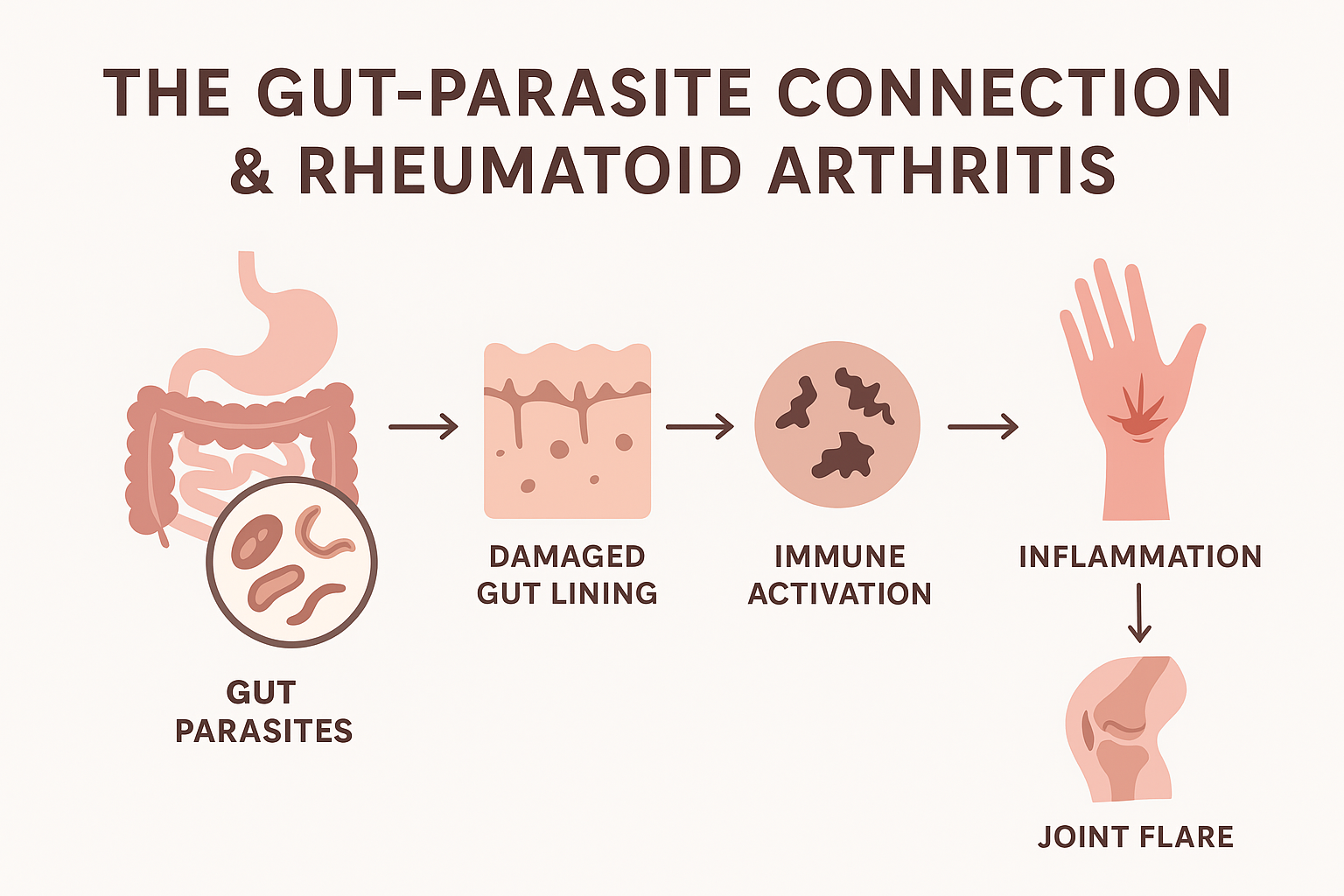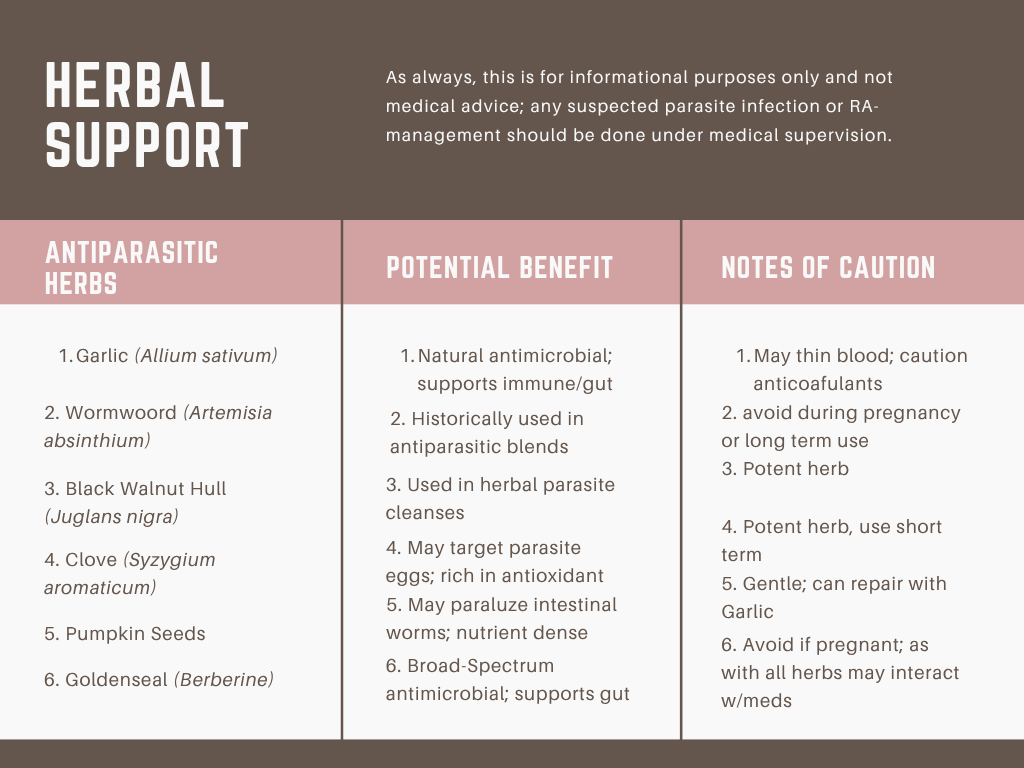Uncovering Parasites’ Role in Rheumatoid Arthritis
Understanding the Rheumatoid Arthritis Connection
Rheumatoid Symptoms go beyond joint pain
When most people think about rheumatoid arthritis (RA), they picture swollen joints, inflammation, and fatigue. But what if I told you that hidden inside your gut—or even other parts of your body—tiny organisms called parasites could be quietly influencing your immune system and inflammation?
It might sound far-fetched, but research is beginning to reveal that parasites and autoimmune diseases, including RA, have a more complex relationship than we ever imagined.
Where Parasites Live in the Body
Parasites aren’t all created equal. Depending on their type, they take up residence in different parts of the human body—each with unique effects on the immune system.
🦠 1. Gut/Intestinal Parasites
These are the most common. They include protozoa like Giardia lamblia, Blastocystis hominis, and Entamoeba histolytica, as well as worms (helminths).
Because about 70% of your immune system lives in your gut, any disruption here can ripple through your entire body.
Studies show that people with RA have higher rates of intestinal protozoa compared to healthy individuals. Coinfections are linked with increased intestinal permeability (commonly called “leaky gut”) and higher levels of inflammatory molecules like TNF-α — both key players in autoimmune activation.
Gut Health
📖 Reference: PMC9039364
🧫 2. Blood & Tissue Parasites
Some parasites move beyond the gut. Toxoplasma gondii, for example, can reside in tissues like the brain and muscles. A meta-analysis found that people with RA were over three times more likely to test positive for this parasite than those without RA.
This doesn’t necessarily mean it causes RA—but it suggests that chronic infection may add fuel to an already sensitive immune system.
📖 Reference: PLOS Neglected Tropical Diseases, 2018
🦴 3. Parasites and the Joints
Though rare, some parasitic infections have been linked to direct joint inflammation. Case studies describe Strongyloides or Blastocystis infections triggering arthritis-like symptoms.
This happens not because the parasite lives in the joint, but because your immune system reacts aggressively—sometimes mistaking your own tissues for the invader.
The Gut–RA Connection: A Closer Look
Here’s where things get fascinating: the gut isn’t just a digestive organ—it’s an immune headquarters, hence the often reference of second brain. When intestinal parasites disrupt this environment, the effects can ripple outward, influencing everything from inflammation to autoimmunity.
🔬 How Gut Parasites Can Worsen RA
They Damage the Gut Lining.
Parasites can weaken tight junctions between intestinal cells, allowing toxins, undigested food particles, and microbes to leak into the bloodstream—a process known as “leaky gut.” This can heighten inflammation and potentially trigger autoimmune flares.They Skew the Immune System.
Some parasites drive inflammatory pathways which are also overactive in RA. Others manipulate the immune system to suppress inflammation—creating a confusing “push-pull” effect.They Alter the Microbiome.
Gut parasites can crowd out beneficial bacteria or alter gut diversity, changing how the immune system “reads” the body’s internal environment.
🧩 Could Parasites Ever Be Helpful?
Interestingly, not all parasites are harmful. Some research explores “helminth therapy,” using controlled exposure to worm proteins to calm autoimmune activity.
A molecule called ES-62, derived from parasitic worms, has been shown to reduce arthritis symptoms in animal models by downregulating inflammatory cytokines.
This duality—parasites as both harmful and potentially healing—shows how complex their relationship with RA truly is.
📖 Reference: PMC5038179
Holistic Support for Parasite Balance and Gut Healing
If you suspect parasites are contributing to your health challenges, it’s important to confirm through proper testing before starting any protocol. Conventional medical treatment (like antiparasitic medication) may be prescribed—but holistic support can also be an option to help restore gut and immune balance afterward.
Herbal Nutrient Support
📖 Reference: PMC9652050
🥗 Lifestyle & Dietary Foundations
Prioritize gut-friendly foods: lots of fiber, vegetables, bone broth, and fermented foods like sauerkraut or kefir.
Hydrate and rest: your liver and lymphatic system need both to process toxins efficiently.
Address nutrient gaps: zinc, selenium, and vitamin A are critical for mucosal repair.
Minimize exposure: wash produce, filter water, and cook meats thoroughly.
Manage stress: chronic stress weakens gut immunity, making infections easier to take hold.
Delicate Balance is Key
Parasites are not inherently “evil.” In fact, our immune systems evolved in part because of our long coexistence with them. The goal isn’t to “nuke” everything that lives in your gut—it’s to restore harmony.
When balance returns, inflammation quiets, and your immune system can do what it was designed to do: protect and heal.
Final Thoughts
The connection between parasites and rheumatoid arthritis continues to be explored, but one thing is clear: your gut health matters. Whether through medical treatment, herbs, or lifestyle shifts, supporting your digestive ecosystem can help regulate inflammation at its source.
If you’re managing RA and suspect gut imbalances, consider working with a qualified practitioner to explore testing and a comprehensive, gentle gut-healing protocol.
Your gut is not just where digestion happens—it’s where healing begins.


